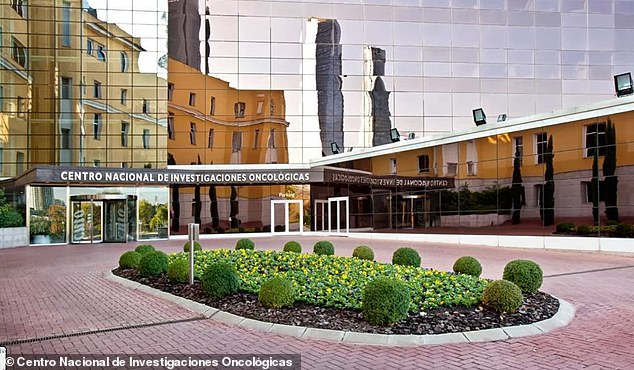Advertisement

One woman who survived a dozen different tumors could hold the secret to curing cancer, scientists claim.
The unnamed patient, 36, was diagnosed with her first mass when she was a toddler and has had new growths forming in different parts of her body every few years since.
Of her 12 tumors that doctors are aware of, at least five were cancerous — developing in her brain, cervix, and colon.
Researchers in Spain monitoring her condition say her immune system is “exceptional” at stopping cancer.
She is believed to be the only person in the world with a genetic quirk that serves as a double-edged sword.
On the one hand, she has an unnatural ability to defeat cankers. on the other hand, it makes them extremely susceptible to tumor formation.
She has two mutations on the MAD1L1 gene, which under normal circumstances should kill an embryo before it can develop in the womb.
The gene is critical to the process of cell division and proliferation, and the mutations cause it to get mixed up and replicate too much.
When the cell begins dividing at a rate that is not necessary, it can lead to tumor growth, which can often progress to cancer.
dr Marcus Malumbres, head of the cancer group at the Spanish National Cancer Research Center (CNIO), said: “We still do not understand how this individual developed at the embryonic stage and could have overcome all these pathologies.”

A 36-year-old woman has a rare mutation that causes her cells to replicate rapidly. As a result, she has suffered a dozen tumors throughout her life. The same mutation that causes growth also protects them from it, as it leads to the rapid production of defense cells. (file photo)

The woman was examined at the CNIO Cancer Research Center in Madrid, Spain (pictured)
A team from the CNIO in Madrid published its case report on the person on Wednesday.
Scientists found that the woman was more likely to develop tumors and cancer due to mutations in the MAD1L1 gene. Her condition is so rare that it has no name.
The person also has skin tags, microcephaly — a condition where a baby’s head is much smaller than expected — and other physical ailments.
When the patient first visited the CNIO’s Familial Cancer Clinical Unit, a blood sample was taken to sequence the genes most commonly involved in hereditary cancer, but no alteration was detected in them.
The researchers then analyzed the woman’s entire genome and found mutations in a gene called MAD1L1.
This gene is essential for the process of cell division and proliferation.
The researchers analyzed the effect of the mutations and concluded that they cause changes in the number of chromosomes in cells – all cells in the human body have 23 pairs of chromosomes.
Animal models have shown that when mutations are present in both copies of this gene – each from one parent – the embryo dies.
In this case, to the researchers’ astonishment, the person has mutations in both copies but survived and lived as normal a life as one might expect from a sick person.
According to Miguel Urioste, the study’s co-author, who headed the CNIO’s familial cancer clinical unit until his retirement in January this year, said no other case like this had ever been described.
He said: “Academically we cannot speak of a new syndrome because it is the description of a single case, but biologically it is.”
While other genes are known whose mutations change the number of chromosomes in cells, the researchers say this case is different due to aggressiveness, the percentage of aberrations it causes, and extreme susceptibility to a large number of different tumors.
The search team was intrigued by the fact that the five aggressive cancers that the patient had developed went away with relative ease.
Their hypothesis is that “the constant production of altered cells in the patient has generated a chronic immune response against these cells, and this helps the tumors to disappear”.
“We believe that boosting other patients’ immune responses would help them stop tumor development,” said Dr. malumbres
Researchers say one of the key aspects of the study is the discovery that the immune system is able to mount a defensive response against cells with the wrong number of chromosomes.
The results could open up new therapeutic options in the future, they suggest.
The study is published in the journal Science Advances.

